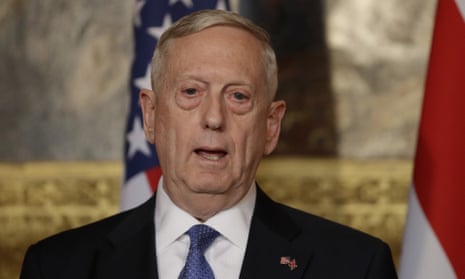The US defence secretary, James Mattis, has described Russia as a “strategic competitor” after meeting his UK counterpart Sir Michael Fallon in London, despite Donald Trump’s White House seeking to work with Vladimir Putin.
Mattis spoke about the extent of Russian interference globally, from other people’s elections to engagement with the Taliban in Afghanistan and its development of a new missile.
“Right now Russia is choosing to be a strategic competitor,” he said, accusing Moscow of interfering in other people’s elections, though he did not specifically mention the the 2016 US presidential race.
Mattis said: “Russia’s violations of international law are now a matter of record, from what happened with Crimea to other aspects of their behaviour in mucking around inside other people’s elections, and that sort of thing.”
His approach contrasts with that of Trump, who has praised Putin and is embroiled in a row over the extend of alleged links between Russia and his campaign team in the run-up to November’s election.
The US defence secretary’s description of Nato’s common defence policy as being the “bedrock” of west’s transatlantic alliance contrasted with Trump who last year cast doubt on American commitments.
Mattis, on his first trip to the UK as defence secretary, told a press conference in London that Nato’s article 5, which commits the other 27 members of the organisation to come to the aid of a member state under attack, was an absolute given.
He was speaking before a visit by Trump to the Nato headquarters in Brussels for a summit in May. On the campaign trail, Trump had described Nato as obsolete and suggested that if most of the European members failed to increase their financial contributions to the alliance, the US would not feel bound to come to their aid.
But Mattis, reflecting US doctrine since the end of the second world war that Nato is the pre-eminent American alliance, said: “Nato stands united, the transatlantic bond is united. We are going to maintain article 5 as (the) absolute bedrock of the Nato alliance.”
In spite of Mattis’s words, other Nato members are warily awaiting Trump’s visit to hear directly from the president whether he has backtracked on his earlier views.
Only the US and UK, along with three other members of Nato, meet the commitment to spending at least 2% of GDP on defence. Mattis and Fallon discussed how to put pressure on the remaining members to pay more.
They also discussed whether Nato could adopt a wider role, becoming more involved in the fight against terrorism globally.
Fallon said: “Secretary Mattis and I have agreed that others must now raise their game and those failing to meet the 2% commitment so far should at least agree to year-on-year real-terms increases.
“And increased burden-sharing is not on its own enough. We’ve also agreed that Nato must modernise and streamline its military structures to ensure faster decision-making and take a 360-degree view of all the security threats that face us.”
The UK just barely makes the 2% commitment and the fall of the pound against the dollar has added to the pressure, given that much of UK military equipment is bought from the US.
The National Audit Office in January warned that the Ministry of Defence would have to find an extra £6bn in savings over the next 10 years.
